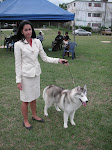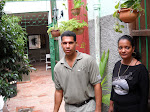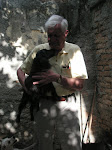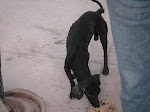One Man’s Meat…
If there are two elements of Cuban society that work well, they are education and health systems. These systems intersect in the University where doctors for people and veterinarians for animals are trained. These professional workers deserve and receive the respect of the man in the street, but they are paid little better than any other workers. So the vets often operate a sideline offering medical care to pet dogs and cats.
A cow or a pig is a unit of production, and therefore it is considered the property of the state. In their regular jobs vets often care for farm animals, but your family’s dog or cat is of no interest to the state, only to his owners. Many of the medicines and supplies used by veterinarians for dogs and cats are scarce or nonexistent in Cuba—especially if they are packaged in the smaller doses made for dogs and cats. Products like flea and tick remedies, dog shampoos, and heartworm medicines are needed in Cuba, although they are abundant here.
In the US many of these meds have expiration dates, and it is illegal to use them after their expiration date. They often sit on a veterinarian’s shelf for months after their expiration dates and are then thrown away. In Cuba drugs have expiration dates too, and those dates are observed for humans, but not for dogs and cats. Sometimes a hospital will even donate outdated drugs to veterinarians.
We have been asking US vets to donate outdated pet meds to us for use in Cuba. We have collected significant quantities for Aniplant in Havana. Cuba allows each visitor to bring in 10 kilograms (22 pounds) of “health products,” and most travelers between Miami and Havana use this allowance to bring in soaps, shampoo, or toothpaste for relatives there. But on our trips we have each been carrying 10 kg of donated outdated vet meds and supplies.
Also notable among Cuban vets is a lack of pill-type medicines. When they have medicines, they are usually in injectable form. The outdated pills we bring in from the US are very welcome as they last longer, are easier to apply, and don’t require the use of sterile syringes.
Nora Garcia, the president of Aniplant, dispenses some vet services from her headquarters on Principe Street in Central Havana. But she knows countless other vets who work in her free weekend spay-neuter clinics. Nothing goes to waste in Cuba, and the extra outdated vet items she doesn’t use herself are traded to local vets for help in the clinics.
Cuban vets have become experts in which medicines last the longest after their expiration. One vet from Old Havana told me he had some old anesthesia drugs from the Cuban campaigns in Angola (in the 1990’s) that still worked.
Waste not, want not.
Les Inglis
Friday, June 25, 2010
Subscribe to:
Post Comments (Atom)






























































































Once again Les, you have answered many of my questions about the situation in Cuba. When you have the chance could you please explain how drugs we secure from our vets can be shipped? Any suggestions would be greatly appreciated.
ReplyDeleteFor others reading this blog: It would be very interesting to learn how you became interested in Aniplant and what some of your concerns might be. Please jump in.....lets get the ball really rolling.
Jim, the process for getting outdated drugs into Cuba is clumsy and slow, but it's all we have. I corral the donations at my house and sort them into 10kg packs. I make an inventory for Nora and she preclears it with customs. The packs go in the luggage of travelers. Believe it or not, we have sent in lots of stuff this way. THere is a way to mail packages, but USPS onoy guarantees it gets to Cuba, not the addressee. I have been successful with one test mailing.
ReplyDelete